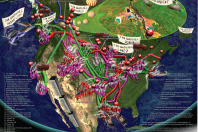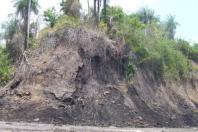Environmentalists sound warning: Tar sand extraction a danger to T&T
Serious environmental issues which may affect southwest Trinidad are on the front burner once again. Environmentalists are now concerned about the Government’s plans to extract oil from tar sands in the La Brea area.
Kyle De Lima, who heads Earthwise Ltd, said the people of south Trinidad could experience serious health and water problems if the Government follows through with plans for extracting an estimated two-billion-barrel oil reserve from the tar sands at La Brea.
Prime Minister Kamla Persad-Bissessar, on her return last week from the Sixth Summit of the Americas in Colombia, announced that Government was looking into the exploitation of these tar sand deposits. The PM also announced that she had spoken to Canadian Prime Minister Stephen Harper about lending his country’s expertise in this area.
De Lima spoke with the media on Thursday, when his organisation hosted a seminar on this issue in Chaguanas. He said Earthwise was not about engaging in radical protest action but plans to educate people through the media on the environmental and health risks of tar-sand mining.
De Lima said there was a global push to market tar sands as oil sands to meet the demand for oil, as petroleum prices continue to rise. He said the United States was seeking to source oil from other areas than the Middle East and Venezuela, and would be the largest consumer of the new source of oil.
The environmentalist said the process involved intensive strip mining to extract the tar sands, and it took around two tonnes of mined materials and two to four barrels of fresh water to extract one barrel of oil. De Lima said this would deplete the potable water reserves unless a desalination plant was established to fulfil the water needs of residents.
The water used in the separation process becomes heavily contaminated and cannot be easily disposed of: it has to be stored in ponds for as much as 600 years, he said. Macdonald Stainsby, a Canadian activist and anti-tar-sand blogger, said in his country, tar sands produce around 1.5 million barrels of oil per day and four times as much toxic water. He said Canadian tar-sand production also produced high levels of greenhouse gases.
Stainsby, who runs the website oilsandstruth.org, has worked as an activist against tar sand for the past five years. He said the refining process produces a plethora of heavy metals and other, similar poisonous substances. The landscape is denuded and huge retention ponds have to be constructed for the toxic water. Stainsby said he wants to educate T&T on the dangers of tar sands.
“We in Canada were never given that choice,” Stainsby said. He said villages of indigenous people near the tar-sand mining operations have suffered the most, and people are dying at record rates from rare cancers and various lung, blood, cardiac and nervous-system problems.
Stainsby said consumption of wildlife and fish near tar-sand operations is extremely dangerous since the meat shows dangerous levels of heavy metals including mercury and arsenic. Nevertheless, he said countries such as Madagascar, China, Russia and the Congo have adopted the Canadian tar-sand mining model. Stainsby said the Canadian projects are going ahead but the activists are moving towards stopping tar sand mining.
http://www.guardian.co.tt/news/2012-04-28/environmentalists-sound-warnin...


